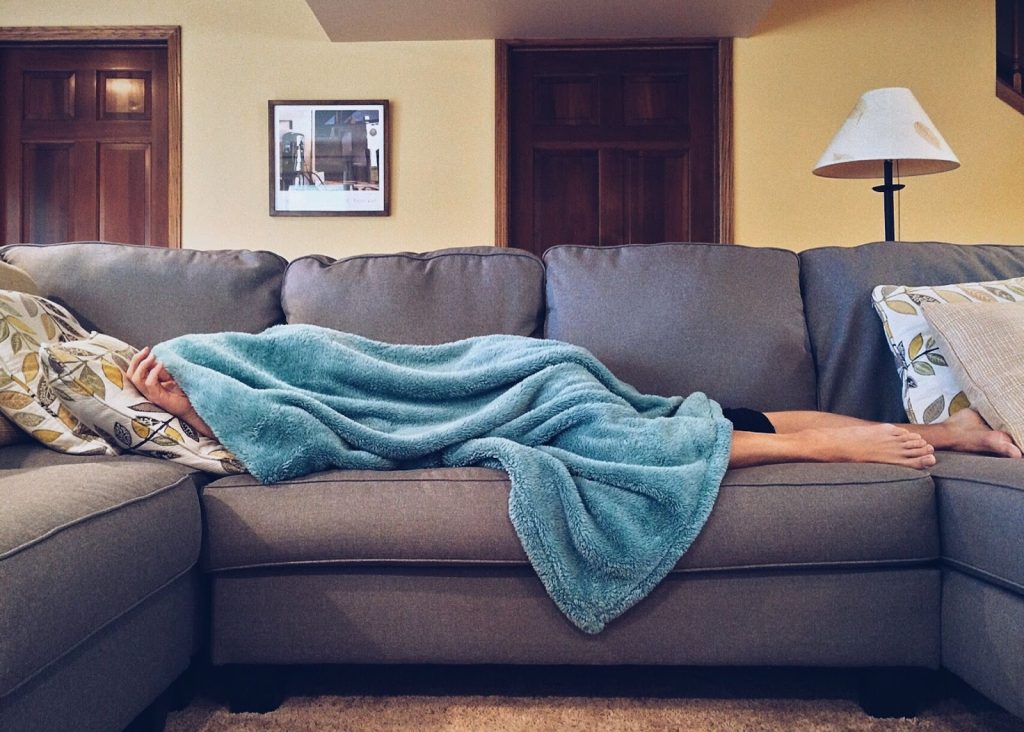Many people suffer from a condition where they can easily sleep on a couch but not in their bed. It’s one of the most frustrating sleep problems and there are multiple reasons why it happens.
If you’re suffering from the same problem and want to know why you can’t sleep in your bed but can on a couch, read this article carefully.
It contains the most common reasons for the problem along with the solutions that you can use to start sleeping again in your bed.
Reasons Why You Can’t Sleep In Bed But Can On Couch
The following are the most common reasons why you can’t sleep in your bed but can on a couch.
Your Couch is More Comfortable Than Your Bed
The first and the most common reason why people sleep better on a couch is that their bed isn’t as comfortable as their sofa. It happens because of poor quality or old mattress that doesn’t support your body evenly.
The life expectancy of most mattresses is somewhere between seven to 10 years and they need to be replaced after that duration. If you don’t replace it when you’re supposed to, it’ll cause discomfort and make it difficult for you to fall asleep.
Other than the quality of the mattress, the frame of your bed can also be a problem. If you’re a light sleeper you won’t be able to sleep on a bed that creaks.
Read also: Why do we sleep on raised beds?
Solution
The solution to this problem is pretty simple. Read the user’s manual of your mattress and replace it as soon as possible if needed. In addition, get the frame of your bed fixed to make sure it doesn’t creak so that you can improve your sleep hygiene and enjoy better sleep quality.
Read also: Can you sleep on a mattress topper on the floor?
You’re Suffering from Psychophysiological Insomnia
Psychophysiological insomnia is yet another common reason why people can sleep on a couch instead of their bed. It’s a sleep disorder, known as a sub-type of insomnia, in which individuals face difficulty falling or staying asleep in their typical home sleep environment.
It happens due to heightened cognitive and bodily arousal. The patients with this condition focus too much on their sleep and become worried at the same time, which keeps them from falling asleep.
If you feel stressed out, have anxious thoughts, and check the time on your phone constantly while trying to sleep in your bed, you’re most probably suffering from psychophysiological insomnia. The reason why you don’t experience these symptoms on your couch is that you’re not worried about not getting enough sleep at that time.
Solution
The best solution for the psychophysiological insomnia condition is to undergo CBT (Cognitive Behavioural Therapy. It’ll allow you to understand the misconceptions and beliefs you have about sleep.
Sleeping On Couch Has Become Your Habit

Feeling tired and stressed out is pretty common for working individuals. Most people sit on their couch after getting home to relax and sometimes they also fall asleep. If you continue to perform this practice, your brain will develop a strong association between laying on a couch and relieving stress.
As a result, your brain will start sending signals to your body to relax and you’ll become sleepy as soon as you sit or lay down on a couch. If you wake up from the couch, your body will become active and you’ll find it difficult to have a good night’s sleep in your bed.
Solution
The solution to this problem is time-consuming. You’ll need to train your body by making sure that you stay active while you’re on your couch. Avoid laying down on a couch and go to your bed whenever you feel sleepy.
In addition, you most probably will find it difficult to fall asleep in your bed. In that case, you should get out of your bedroom and do something like reading a book rather than lie awake. With time your brain will learn to turn on the natural sleep mode when you enter your bedroom.
Your Couch Offers a Better Sleeping Environment
Not only the quality of your mattress and bed is important but the environment of your bedroom also matters. Your living room may have a better vibe and atmosphere than your bedroom which aids you to sleep quickly and comfortably.
If you also use your bedroom for studying or working, your mind won’t feel relaxed when you’re in that area. That’s because the working or studying equipment and supplies can work as a source of stress. In addition, too much lightning, poor temperature control, lack of ventilation, and strong smells are some other reasons that can keep you from sleeping in your bed.
Solution
The easiest way to handle this problem is to improve your bedroom’s environment. You’ll need to figure out what elements bother you and keep you from sleeping in your bedroom.
You might also need to inspect your living room to find out what elements aid you sleep quickly on your couch. After that, you’ll need to make necessary adjustments to improve the environment of your bedroom.
Read also: Can meditation replace sleep?
Your Relationship with Your Partner is Tensed
Every relationship goes through hard times and you need to make a lot of adjustments in your lifestyle to keep it going. If you live with your partner and are experiencing a relationship problem, you’ll have trouble falling asleep in your own bed.
Sleeping on your couch can be a temporary way to escape from the tension and depression that your relationship is giving you.
Solution
The best way to resolve this problem is to get yourself ready and talk to your partner in order to deal with the issue positively. You can also read our guide on sleep hygiene for couples.
You’re Suffering from Congestion or Sleep Apnea

When you’re suffering from congestion or sleep apnea, it’s difficult to sleep if your head and chest are not raised higher than the rest of your body. That’s because you find it difficult to breathe in that position. Typically, a couch raises your head and chest higher than the bed and allows you to fall asleep easily.
Solution
You’ll need to visit a local sleep clinic to treat your congestion and make sure you have clearer airways. Keep in mind that sleeping on the couch with your head and chest elevated can lead to back and neck pain.
Final Words
There are several drawbacks to sleeping on a couch. Not only does it offer a limited space but it can also lead to neck and back pains. That’s why you should not make a habit of sleeping on a couch. We hope this guide will help you understand why you can’t sleep in your bed but fall asleep easily on a couch.
